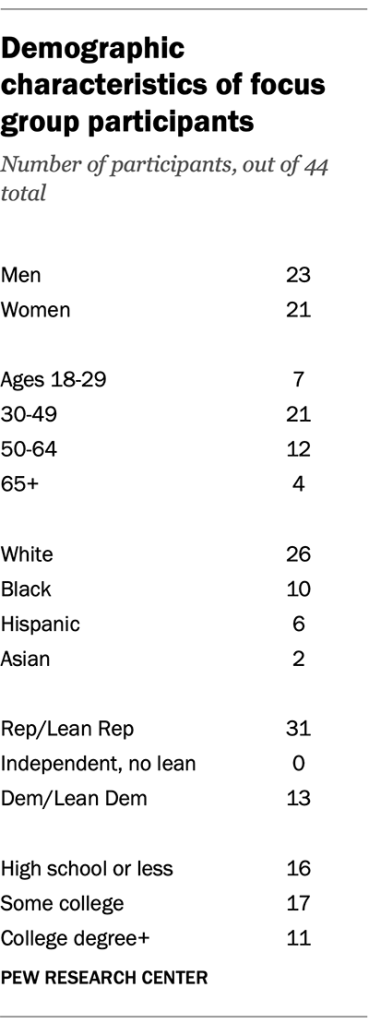Focus groups
Pew Research Center worked with PSB Insights to conduct nine 90-minute online focus groups with a total of 44 U.S. adults from Sept. 24 to Oct. 10, 2024. The intent of this project was to explore the attitudes and experiences of adults without a four-year college degree, adults in rural areas, and people who identify as politically conservative. The purpose of this effort was to help the Center identify issues salient to these groups. The participants are not nationally representative, and the results are not framed in quantitative terms. Quotes were lightly edited for spelling, punctuation and clarity.

Recruitment
PSB Insights recruited participants for the focus groups as described below. All participants had to be 18 years of age or older (19 or older if living in Alabama or Nebraska and 21 or older if living in Mississippi), live in the U.S., and have access to a computer or mobile device with high-speed internet access and a working webcam.
- Focus group comprised of White adults without a college degree, of mixed ages and gender (men/women), living in an urban or suburban location. Participants have a mix of partisan affiliations and are moderate in ideology. Participants also say they follow the news at least some of the time and use social media at least once a week.
- Focus group comprised of White adults without a college degree, of mixed ages and gender (men/women), living in an urban or suburban location. Participants have a mix of partisan affiliations and are moderate in ideology. Participants do not regularly follow the news or use social media.
- Focus group comprised of White adults without a college degree, of mixed ages and gender (men/women), living in a rural location. Participants identify as Republican or are independents who lean Republican and are ideologically conservative or moderate. Participants also say they follow the news at least some of the time and use social media at least once a week.
- Focus group comprised of White adults without a college degree, of mixed ages and gender (men/women), living in a rural location. Participants identify as Republican or are independents who lean Republican, and are ideologically conservative or moderate. Participants also do not regularly follow the news or use social media.
- Focus group comprised of Black adults of mixed ages and gender (men/women), living in a rural location. Participants have varying levels of educational attainment, and also say they follow the news at least some of the time and use social media at least once a week.
- Focus group comprised of Black adults of mixed ages and gender (men/women), living in a rural location. Participants have varying levels of educational attainment, partisan affiliations and political ideologies. Participants also do not regularly follow the news or use social media.
- Focus group comprised of White adults with at least some college education, of mixed ages and gender (men/women). Participants identify as Republicans, are ideologically conservative and supported Donald Trump (who was a candidate for president at the time the focus groups were conducted).
- Focus group comprised of young adults ages 18-29, of mixed genders (men/women), racial/ethnic identities and levels of educational attainment. Participants identify as Republicans, are ideologically conservative and supported Donald Trump (who was a candidate for president at the time the focus groups were conducted).
- Focus group comprised of Hispanic adults, of mixed ages, and gender (men/women), and levels of educational attainment. Participants identify as Republicans and are ideologically conservative.
Lastly, eligible participants had to be willing and able to contribute to the research, attend the focus group on the set date and time, and sign an informed consent form before they could participate. This included agreement that all responses could be used for research purposes, though participants’ names and identifying information would remain private.
For each focus group, the research team overrecruited participants to account for “no-shows” or other issues preventing participation. Seven participants were recruited to participate in each focus group, for a total of 63 recruited overall, and four or five were ultimately selected to participate (also known as “seated”) in each of the nine groups. Each participant was offered a $125 incentive for participating.
Discussion
The Pew Research Center and PSB Insights research teams developed the discussion guide through an iterative process. Minor edits were made to the discussion guide after the first week of fielding, including cutting some questions and adding follow-up questions to others to dig deeper into our key areas of interest.
After the moderator established ground rules and participants introduced themselves, each focus group discussed three broad sets of topics:
- News consumption, trust and representation
- How do individuals access and evaluate news and information in the current media environment? To what extent do people feel represented in the media they consume, and how does this influence their views on journalists and news organizations?
- Online experiences and community engagement
- How do online platforms shape individuals’ understanding of free speech and censorship, as well as their interactions within their communities?
- Political issues, including the 2024 presidential election
- What factors drive individuals’ interest in politics and elections, and how do they perceive the current political landscape?
After these discussions, the moderator gave participants the opportunity to bring up any other topics that they felt should have been covered.